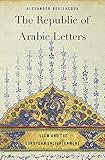The republic of Arabic letters [electronic resource] : Islam and the European enlightenment / Alexander Bevilacqua.
Material type: TextPublication details: Cambridge, UK: : The Belknap Press of Harvard University Press, 2018.Description: 1 online resourceISBN:
TextPublication details: Cambridge, UK: : The Belknap Press of Harvard University Press, 2018.Description: 1 online resourceISBN: - 9780674985698
| Item type | Current library | Call number | Status | Date due | Barcode | |
|---|---|---|---|---|---|---|
| E-Resources | Main Library E-Resources | 909.09767 B571 (Browse shelf(Opens below)) | Available | E005218 |
The Oriental library The Qur'an in translation A new view of Islam D'Herbelot's Oriental garden Islam in history Islam and the enlightenment.
The foundations of the modern Western understanding of Islamic civilization were laid in the seventeenth and eighteenth centuries. Well after the Crusades but before modern colonialism, Europeans first accurately translated the Qur'an into a European language, mapped the branches of the Islamic arts and sciences, and wrote the history of Muslim societies using Arabic sources. The Republic of Arabic Letters provides the first panoramic treatment of this transformation. Relying on a variety of unpublished sources in six languages, it recounts how Christian scholars first came to a clear-eyed view of Islam. Its protagonists are Europeans who learned Arabic and used their linguistic skills to translate and interpret Islamic civilization. Christians both Catholic and Protestant, and not the secular thinkers of the Enlightenment, established this new knowledge, which swept away religious prejudice and cast aside a medieval tradition of polemical falsehoods. Beginning with the collection of Islamic manuscripts in the Near East and beyond, the book moves from Rome, Paris and Oxford to Cambridge, London and Leiden in order to reconstruct the most important breakthroughs in this scholarly movement. By identifying the individual manuscripts used, The Republic of Arabic Letters reveals how the translators, willing to be taught by Islamic traditions, imported contemporary Muslim interpretations and judgments into the European body of knowledge about Islam. Eventually, their books reached readers like Voltaire and Edward Gibbon, who assimilated not just their factual content but their interpretations, weaving them into the fabric of Enlightenment thought.-- Provided by publisher.
There are no comments on this title.

